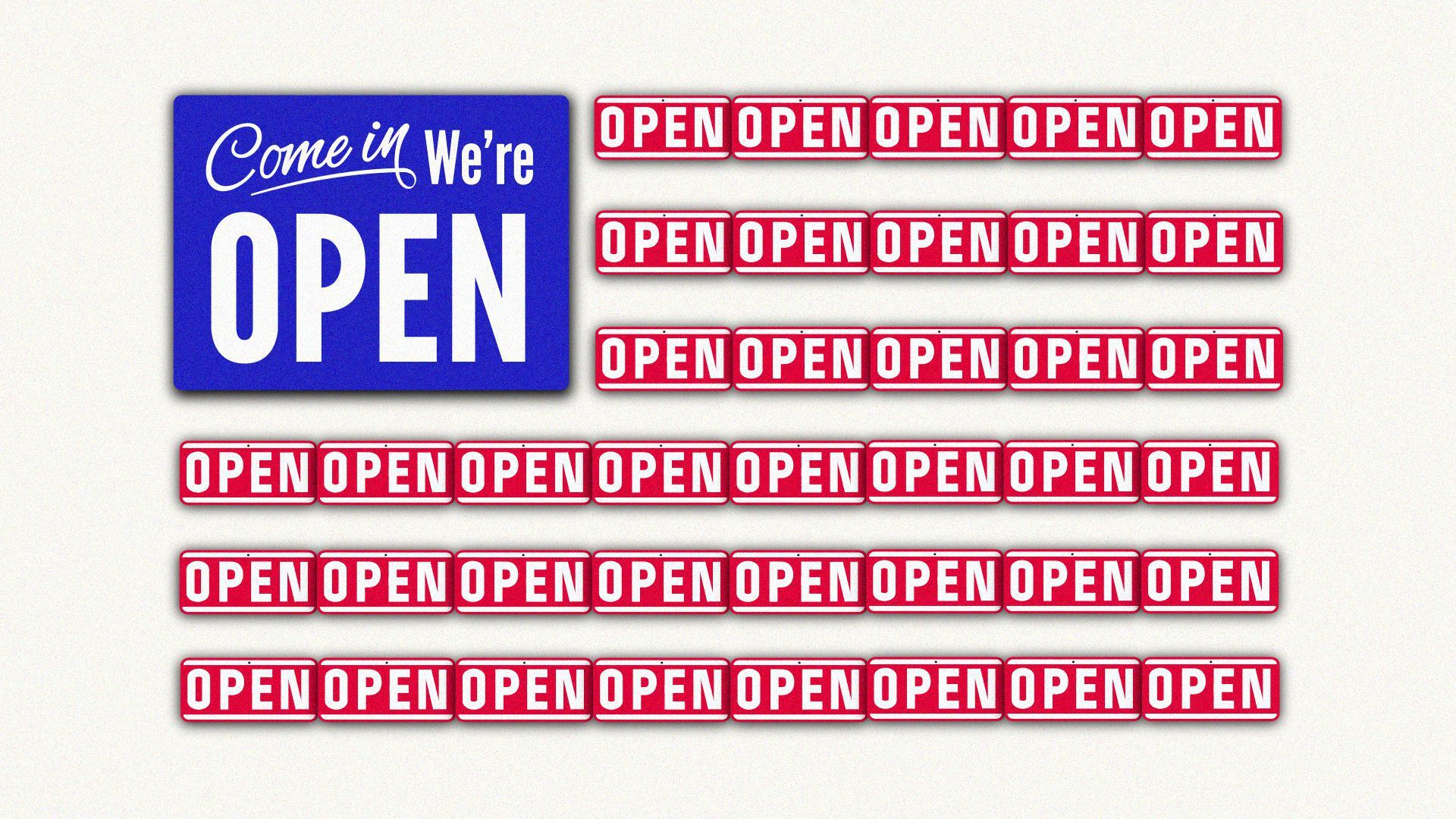| | | | | | | | | | | Axios What's Next | | By Joann Muller, Jennifer A. Kingson and Erica Pandey ·Feb 28, 2022 | | ✈️ Looking ahead to summer travel? Pent-up demand has airlines looking for even more ways to rope you into their frequent-flyer programs. - Our newsroom continues to follow the Ukraine-Russia crisis. Check out our round-the-clock coverage here.
- Share your photos and stories of "what's next" with us at whatsnext@axios.com.
Today's Smart Brevity count: 1,106 words ... 4 minutes. | | | | | | 1 big thing: Airlines want to lock you in |  | | | Illustration: Aïda Amer/Axios | | | | Delta Air Lines is joining the "buy now, pay later" craze, a new wrinkle in a wave of airline marketing schemes designed to lock in customer loyalty ahead of what experts say could be the busiest travel season ever, Joann Muller writes. Why it matters: Loyalty programs are huge moneymakers for airlines, and this year's pent-up travel demand gives them a rare opportunity, when habits are up for grabs, to boost their brands' "stickiness" and diversify their revenue. What's happening: Delta's new "buy now, pay later" option lets customers create a fixed monthly payment plan, with no interest, if they book their flight using Delta's co-branded American Express credit card. - The payment option follows Alaska Airlines' newly announced subscription service, which lets customers pay as little as $49 a month for six flights a year to certain West Coast destinations.
- Both are examples of how airlines are looking to boost their alternative sources of revenue while tightening their grip on consumers' wallets.
How it works: Airlines make money by selling frequent-flyer points to banks, which then award them to credit card holders as rewards for purchases. - Airlines are paid 1 to 1.5 cents per mile by the banks, plus a bonus when new customers sign up for their branded credit card.
- Banks collect the annual fees but take most of their cut in the form of "swipe fees" when customers use the cards for purchases.
- The more consumers spend, the more miles they earn for free vacations, upgrades and other perks, incentivizing them to use the airline's credit card.
Today's loyalty programs extend far beyond flying, with points-earning partnerships that include Instacart, Uber and other lifestyle brands. - "The airlines realized there's a lot more opportunity to make money from these programs than just engendering loyalty," David Slotnick, senior aviation business reporter at The Points Guy, tells Axios.
The big picture: Loyalty programs — especially branded credit cards — have become increasingly lucrative to airlines. - Delta has said its long-term deal with American Express is expected to bring in as much as $7 billion in revenue annually by 2023.
- Some analysts argue that frequent-flyer programs are the most profitable part of the airline business, but that's difficult to confirm since few airlines break out details on their programs.
Read the rest. |     | | | | | | 2. Why pandemic traffic deaths surged in the U.S. |  Data: International Transport Forum; Chart: Will Chase/Axios The United States is rethinking its approach to transportation safety amid a surge in traffic deaths during the pandemic, when other developed countries saw a decline, Joann writes. Why it matters: American roads have been getting deadlier, with motorist and pedestrian fatalities rising at a record pace, a trend that Transportation Secretary Pete Buttigieg calls a "national crisis." - An estimated 31,720 people died in crashes through the first nine months of 2021, up 12% compared to the same period in 2020, U.S. data shows.
- That's on top of a 7.2% increase in deaths seen in 2020.
Between the lines: The AAA Foundation for Traffic Safety wanted to find out why traffic deaths surged in the U.S. during the pandemic, even though data showed people were driving less. What they found: While most drivers reduced their driving during health-related shutdowns, a small proportion (4%) drove more, and those were younger and disproportionately male — a statistically riskier driver group than the average population. What to watch: Buttigieg recently announced a new approach to road safety that's similar to what other countries are already doing. Read the rest. |     | | | | | | 3. Biden's back-to-work push |  | | | Illustration: Shoshana Gordon/Axios | | | | The Biden administration plans to accelerate the return of the federal workforce this week, Axios political reporters Hans Nichols, Glen Johnson and Stef Kight scooped over the weekend. Why it matters: The White House wants to show the country that in-person work can be safe. Between the lines: President Biden's team is discussing the best way to send a clear back-to-work signal to America — perhaps in the State of the Union address on Tuesday, but more likely in a separate COVID-19 speech later in March. - "He will talk about the government leading by example — that COVID should no longer determine where people are working," an administration official told Axios.
The big picture: Nearly two years in, huge swaths of the federal workforce aren't back in the office. Agencies have been allowed to set their own policies, and are in various stages of return. - Vaccinations, boosters and declining hospitalizations and deaths are making a return to shared spaces less risky and more inevitable.
- The CDC loosened masking guidelines Friday — another milestone expected to ease more federal workers' return.
Read the rest. |     | | | | | | A message from Axios | | Recruit top talent with Axios Local | | |  | | | | Axios Local now has job boards in the fastest growing cities in America. Reach smart professionals that visit Axios Local daily to make decisions about where to work, what to do and where to live. Post your job opening on Axios Local. | | | | | | 4. ICYMI: Dive into the supply shortage |  | | | Illustration: Shoshana Gordon/Axios | | | | We've been writing about supply chain disruptions and how they're triggering shortages and delays on everything from Thanksgiving side dishes to Valentine's Day bouquets. The big picture: Our colleagues on the business team dived deeper into how we got here — and how we can get out — in a special report on the supply chain. Some highlights: Product shortages, delays and corresponding price spikes have become a fact of life in America since the pandemic started. To end it, either demand has to go down — which could be rough — or supply has to go up, which means we'd have to wait it out, Axios' Nathan Bomey writes. - The complexity of the crisis means there's no easy answer — and no painless answer, either.
- "There's no shortage of reasons why this supply chain crisis is occurring," says Holly Wade, executive director of the National Federation of Independent Business Research Center. "It's all intertwined."
The two most likely scenarios for ending the crisis, according to experts and business leaders, are: 1. People stop buying so much stuff. And they will. At some point. 2. Time passes. It might just take time for the supply chain to ramp up to make enough stuff to keep up with consumer demand. Read the rest. |     | | | | | | 5. Accessories for a truck that doesn't exist |  | | | CyberLandr pop-up camper designed for Tesla's Cybertruck. Image courtesy of Stream It | | | | An entire cottage industry has sprung up around Tesla's proposed Cybertruck, with crowd-funded entrepreneurs designing accessories for an outlandish pickup truck that doesn't yet exist, Joann writes. What's happening: Jalopnik provided a fun rundown of all the budding engineers eager to capitalize on the Cybertruck — if and when it ever goes on sale. There's the CyberLandr (above), a pop-up camper that claims $110 million in "pre-orders" and features a bedroom, living room, kitchen, bathroom and office when fully deployed. Cybercat, designed by a Seattle engineer, is a pair of add-on pontoons that turn your Cybertruck into a boat. Form Camper, another would-be Cybertruck RV, has perhaps wisely designed its unit to work with other electric trucks as well. What to watch: Tesla CEO Elon Musk says the Cybertruck, first shown in 2019, is now delayed until 2023. Read the rest. |     | | | | | | A message from Axios | | Recruit top talent with Axios Local | | |  | | | | Axios Local now has job boards in the fastest growing cities in America. Reach smart professionals that visit Axios Local daily to make decisions about where to work, what to do and where to live. Post your job opening on Axios Local. | | | | Was this email forwarded to you? Get your daily dose of What's Next magic by signing up for our free newsletter here. |  | Bring the strength of Smart Brevity® to your team — more effective communications, powered by Axios HQ. | | | | | | Axios thanks our partners for supporting our newsletters. If you're interested in advertising, learn more here.
Sponsorship has no influence on editorial content. Axios, 3100 Clarendon Blvd, Suite 1300, Arlington VA 22201 | | | You received this email because you signed up for newsletters from Axios.
Change your preferences or unsubscribe here. | | | Was this email forwarded to you?
Sign up now to get Axios in your inbox. | | | | Follow Axios on social media:    | | | | | |
Post a Comment
0Comments